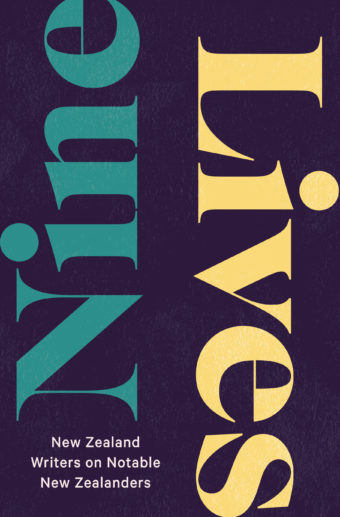Curious.
The editor/s for this collection of essays remain unnamed. All we read is, ‘We asked our authors to provide an essay on a notable New Zealander of their choice… Enjoy. Upstart Press.’
Curiouser.
There are no stated criteria for notability. My dictionary defines notability as, ‘Worthy of note, striking, remarkable, eminent’ but eminent to whom, or to what? New Zealand history? Current politics? Business? Personal family or whanau?
For a reviewer this is unnerving. What is this book trying to do? For readers, it is more than offset by some great writing.
Left, presumably, to their own devices, the essayists cover a range of New Zealand writers, leaders, politicians and sportspeople — all personally influential, all grazing the lives of the writers in some way.
In the most engaging of these, this proximity is close — the subject has been a touchstone, a mentor, a mirror even for their own lives. In the first essay (the order, we are told, was determined by drawing lots), Catherine Robertson presents a compelling portrait of doctor and trailblazing abortion advocate Margaret Sparrow. She begins with her own abortion at 21 — ‘I was given a local anaesthetic and a foetus was aspirated from my womb’ — then moves quickly to that of Sparrow, her abortionist, at the same age, ‘This woman had fought fiercely for longer than I’d been alive to give women more autonomy over their bodies, more choices about their reproductive future.’ The account deftly weaves these stories around a brief history of abortion in this country, circling back to alight again and again on the personal experience of courage and sadness.
This proximity is evident, although not so overtly, in Stephanie Johnson’s important portrait of Carole Beu, unlikely businesswoman (and only businessperson to feature in this book) and founder of Auckland’s Women’s Bookshop. Opened in 1989, the bookshop became a social hub, a place of warmth, conviviality, vitality and much-admired guacamole, championing a new wave of feminist literature and inspiring a new generation of young women writers — including Johnson.
Surprisingly — disappointingly — these are the only two essays that focus on women, but that sense of personal engagement is threaded though these stories.
In her spare yet intimate portrait of Matiu Rata, Paula Morris tracks the life of the Māori leader and politician from ‘the end of our world, the flickering tail of Te Ika a Māui, Te Hāpua’ to Auckland then, at the age of 29, to Parliament where he becomes the first Māori Minister of Māori Affairs, instigator of the New Zealand Day Act (calling it ‘Waitangi Day’, he feared, could spark a ‘Pākehā backlash’) and progenitor of the Waitangi Tribunal and the Mana Motuhake movement.
Morris first meets him as a child in Auckland’s Vulcan Lane, where her grandmother is raising money for the Māori Women’s Welfare League. He is ‘smiling and warm; we are all in awe of him.’ He follows Morris’ progress through school and university. He is distant, but he is there.
First encounters are threaded through this book. Greg McKee’s finely crafted portrait of legendary All Black Ken Gray begins in Circa Theatre, McGee sitting nervously behind Gray and his wife Joy at the opening of his play, Foreskin’s Lament. Gray’s astonishing departure from rugby was prompted by the 1968 All Blacks tour of apartheid South Africa — an ‘immoral regime’, he concluded. It was a tough stance, writes McGee, pitching him from the epicentre of Wellington rugby to being, ‘well, back on the farm at Plimmerton.’
Selina Tusitala Marsh is a young university student when she first encounters Albert Wendt — ‘the godfather of Pacific literature’. He is austere, distant, ‘plain ole grumpy’, but he becomes a mentor, a role model, a relentlessly inquiring and incisive writer. For Pala Molisa (Marsh and Molisa co-author the essay on Wendt, so bringing the number of writers to ten), Wendt is the teacher, activist, a ‘warrior’ within the revolutionary politics of Pacific independence.
Lloyd Jones similarly deliberates on which version of his subject to focus on. Slowly, skilfully, he weaves together his portrayal of Paul Melser the local potter, Paul Melser the activist and Paul Melser the cricketer. The essay is full of patience — the patience required in building a home and pottery from an old pig farm near the foot of the Tararua Ranges, of growing a forest, a community tradition of cricket, a pot — ‘A pot or bowl cannot be hurried into completion. It is an exercise that requires a degree of humility.’
The essays move towards and away from their subjects like a tide. For Elspeth Sandys, Rewi Alley — ‘Uncle Rewi’, her mother’s cousin — is a distant, controversial figure in remote China (she was once given a bloodied nose because her uncle was ‘a commie’), but also an ally, a guide. Most importantly, she writes, he is ‘the living proof that art is as necessary to survival as bread and water.’
Malcolm Mulholland’s description of Ranginui Walker — academic, teacher, writer, Māori rights and social justice campaigner — is relayed through the impact of Walker’s 1990 book, Ka Whawhai Tonu Matou: Struggle Without End, a history of Aotearoa from a Māori perspective that launches Mulholland on his own search for identity.
Paul Thomas’ account of cricketer John Wright is that of an experienced journalist, sportswriter and commentator, teasing apart Wright’s ‘ambivalent, perhaps even-love hate relationship’ with cricket.
The design of this book feels perfunctory, the essayists’ bio photos unnecessary, but Nine Lives provides a heart-warming insight not just into nine noteworthy Kiwis, but also on the attributes some of our best writers consider ‘notable’.
This review was originally published on the Academy of NZ Literature site.



